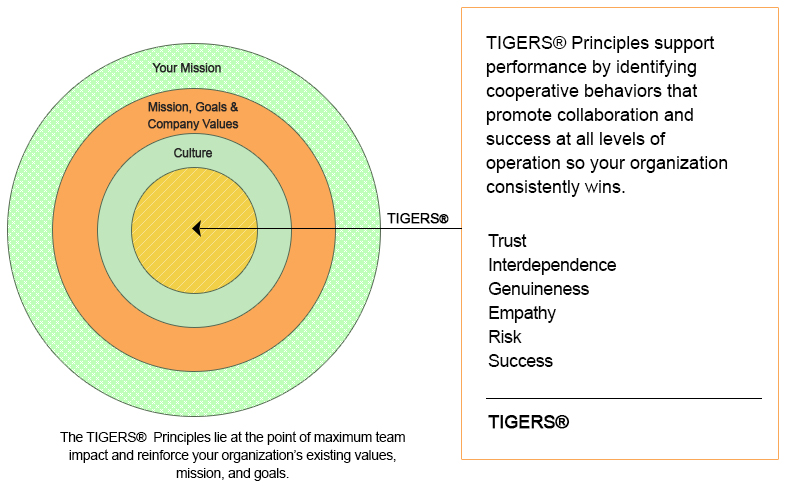 No one person in business is an island. It takes many people with differing personalities to make an organization successful. This means that employee cooperation and good teamwork is a must for an engaged and productive workforce. To get your organization into top operating shape, executives must focus on effective leadership strategies to build high performance teams.
No one person in business is an island. It takes many people with differing personalities to make an organization successful. This means that employee cooperation and good teamwork is a must for an engaged and productive workforce. To get your organization into top operating shape, executives must focus on effective leadership strategies to build high performance teams.
Teambuilding leadership strategies that build high performing teams
With the following teambuilding leadership strategies, leaders can successfully build high performing teams.
Focus on paths that lead to more meaningful work to build high performing teams.
As a leader, you are likely met with a multitude of daily distractions. The most successful leaders recognize how to rise above distractions. They have learned to focus on important paths that lead to more meaningful work.
Some areas that successful leaders focus on include;
- Communication clarity;
- Relationship building; and,
- Problem-solving solutions.
To build high performing teams, leaders need to be clear in specific areas of communication. These areas include goals, priorities, expectations and feedback to ensure team members are on the same page. This also includes helping employees prioritize performance expectations. When clarity is lacking, leaders will likely be displeased with performances and outcomes — and, it isn’t the employee’s fault.
Leaders also need to focus on building genuine relationships with their team members. The stronger the relationship between leaders and employees, the easier it is to communicate and the easier to build trust.
Along with clarity and relationships, leaders must also focus on solutions to problems. Discovering solutions comes as a result of collaborating with employees to discover their insights to problems facing the group. Effective problem-solving comes as a result of understanding one another and trusting the team.
Value the individual to build high performing teams.
Nothing compares to one-on-one conversations. This includes giving feedback and in building workplace relationships.
The G in TIGERS®, genuineness, is an essential principle required for high performing teams. The path to genuine relationships is through individual connections and relationships. To form them, respect and appreciation are needed to value an employee as an individual.
When leaders value their team members on a personal basis, they are more apt to invest in their personal development. This helps the team member feel more connected to coworkers, leaders and organizations. The result is improved loyalty and engagement.
Leaders can lead their team members to high performance when they recognize their interdependence and the potential synergy they bring to team outcomes. This means leaders take the time to identify a team member’s personal strengths and opportunities for improvement. They work to isolate an employee’s performance needs and identify barriers that could be impacting their success. None of this can be accomplished if leaders do not know their team members on an individual level through genuine communications and positive relationships.
Provide feedback to build high performing teams.
While it may be uncomfortable for leaders, to provide regular feedback is important for team member success. Team members are hungry for it. The days of the annual performance review are being eclipsed by more regular, consistent feedback.
Employees want to know that they are meeting expectations. They expect meaningful conversations through ongoing dialogue.
The annual performance review is still expected by many, but nothing said in the review should be a surprise to either party. Any grievance or accolade should be discussed in real-time, as they occur. Instead, the annual review should be a time for reflection and goal-setting for the upcoming year.
Complete ongoing leadership training to build high performing teams.
Leadership training should never be viewed as a one-and-done scenario. Industry trends are constantly changing. Therefore, leaders should be open to adapting to ever-changing work demands. Ultimately leaders should view themselves as facilitators of high performing teams. Managers who are good facilitators bring people together to work toward solutions. As a result, groups accomplish more with high levels of commitment and accountability.
Through manager as facilitator training programs, leaders learn how to reduce group conflict. They learn how to restore positive behavior and promote good decision-making practices among team members. Even if leaders have attended training in the past, ongoing training is essential for successful, high performing teams.
Teams are inevitable in business. Building cooperative and engaged teams should be seen as a top priority for all leaders. In order to create high performing teams, teambuilding leadership strategies are required for success. Some strategies include:
- Focusing on paths that lead to more meaningful work including prioritizing clarity, relationships and solutions;
- Valuing the individual and focusing on building genuine relationships;
- Providing regular feedback for all team members, rather than just completing annual reviews; and,
- Completing ongoing leadership training to become successful facilitators of high performance teams.
With these strategies, leaders can help their team members to be more engaged, loyal and invested in their organization.
Care to dig deeper into this conversation?
Consider the following articles for more information:
- 3 Reasons Why Performance Development Wins in the Workplace
- Give Performance Reviews That Actually Inspire Employees
- Manager as Facilitator Training. Learn to build powerful group norms and cross-functional teams.
Copyright TIGERS Success Series, Inc. by Dianne Crampton
About TIGERS Success Series, Inc.
 TIGERS® Success Series provides a comprehensive, multi-pronged and robust system for improving both your work environment and profitability.
TIGERS® Success Series provides a comprehensive, multi-pronged and robust system for improving both your work environment and profitability.
We specialize in training your managers in group facilitation methods that build workforce cooperation and high performance team dynamics. Scaled to grow as your organization and leadership performance grows, our proprietary Team Behavior Profile and Management training workshops are based on the six principles we have found to be the right mix to make this happen.
The TIGERS 6 Principles are Trust, Interdependence, Genuineness, Empathy, Risk and Success. Born from our many years of business, psychology, and educational group dynamic research, and subsequent four years of independent evaluation, we instill and sustain behaviors that improve work group performance and talent retention for measurable ROI.
TIGERS serves committed leaders who desire enhanced cooperation among departments, teams, managers and individual employees. This heightened level of cooperation leads to improved revenue, purpose, commitment and impact. Employees quit companies because they don’t get along with leaders and co-workers. Work culture refinement and behaviors that build strong relationships erase this trend in fully measurable ways.
For more information or to request a presentation to your group or association, call 1+541-385-7465 or visit https://corevalues.com
A good read!Team work makes the dream work is a commonly used phrase across the globe. What happens when a team fails to function smoothly? This creates the need to improve employee engagement and motivate employees. Learn how you can do this on our blog: https://blog.peoplehum.com/employee/employee-engagement-road-to-building-high-performance-workforce/#bl